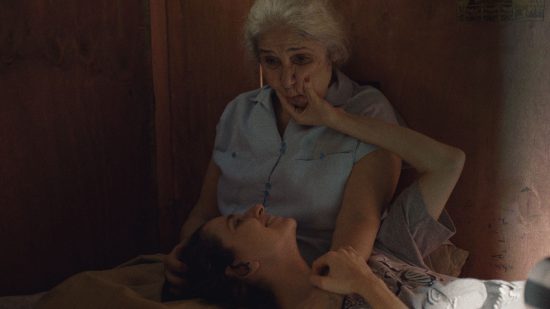Sundance 2024 Film Review: Malu – “a perfect example of what you can do with a lot of heart”

A Still from Malu by Pedro Freire, an official selection of the World Dramatic Competition at the 2024 Sundance Film Festival. Courtesy of Sundance Institute.
It’s fitting that my first film of the 2024 Sundance Film Festival is one about a woman struggling to fulfill her dreams. This is a festival of independent films and filmmakers, people who have toiled for years to bring their visions to brilliant life. Director Pedro Freire is one of these filmmakers, who brings his very personal debut feature, Malu, to Park City, Utah. Turns out, his inclusion in the festival has brought him success even before it has begun, with the film already being picked up for international sale, a sign of confidence in this project.
It’s confidence well placed, with Freire crafting a drama about three generations of women, all with their own traumas, amongst the backdrop of Brazil’s fragile new democracy in 1990’s Rio de Janeiro. Coming himself from a family of actors, Freire based the film on his turbulent relationship with his own mother, Malu Rocha, who passed away in 2013. The writer/director notes he sees his film as being about “a woman who suffers the difficulties of being a female artist in a country that insists on ostracizing its artists.” Yet, at its heart it’s also about how these women have all grown up and existed in different times, and how their viewpoints alongside their own personal histories affect their relationships with one another.
The one thing Malu and Lili can agree on is their love for Joana (Carol Duarte), Malu’s daughter. Joana has a strained relationship with her mother, who is a volatile woman, her moods changing in moments from the highest of highs, to the lowest of lows. Joana, having moved to São Paolo for her own acting career, visits on occasion, but it’s clear her and Malu go through bouts of prolonged estrangement.
The three women live, and have lived, vastly different lives. Malu, a mercurial woman who defiantly wants to see her grand and seemingly impossible dreams come to life, is the glue holding this fragile family together. Though revealing their own individual traumas, some vulnerability and a lot of empathy is needed to truly repair their bonds.
Malu assembles a talented core cast whom all give moving performances. Whether it is Malu explaining to anyone who will listen about her plans for an ambitious cultural centre, Lili and Joana sharing a laugh remembering childhood memories, or a night where personal trauma is revealed, the actors move deftly through their characters’ various moods and moments. It’s an emotional roller coaster for all three women, navigated with seeming ease.
Freire keeps things relatively well-paced here, and his framing is largely intimate, keeping shots tight as we witness these family moments. His writing never gives everything away at once, dropping hints of past issues between characters without making every detail known. Freire also gives this film some political context, though in keeping those details a bit more vague, those unfamiliar with Brazilian history might have some homework to do afterwards. The director is not big on exposition, and while certainly a welcome strategy, it means you must pay particularly close attention to pick up on all the conditions that influence this family’s strained connection.
Malu is a perfect example of what you can do with a lot of heart, on even a low budget. Clearly, Pedro Freire had so much inspiration from his family and his mother and that personal connection shines through. There’s a lot of complexity to Malu, much more than just one woman’s journey, as it is also about how we are shaped by our past, when we grow up, and how that constructs our own paradigms. This, for me, is what makes Malu so relatable. For it can be so difficult to understand how our parents, or the next generation, see the world. If only we could develop more empathy for those who experience life in a different time, perhaps our relationships would be so much more fulfilling.

Malu premiered at the Sundance Film Festival January 21, 2024. It continues to have screenings in person and online (for those in the U.S.) during the festival. For more information head to festival.sundance.org.










I like your summary. I am a Brazilian man who try to get information about our cinema and follow film festivals Througout the websites .
Obrigado! A colleague I work with is Brazilian so I do try to check out your country’s films! This was a good one! 🙂